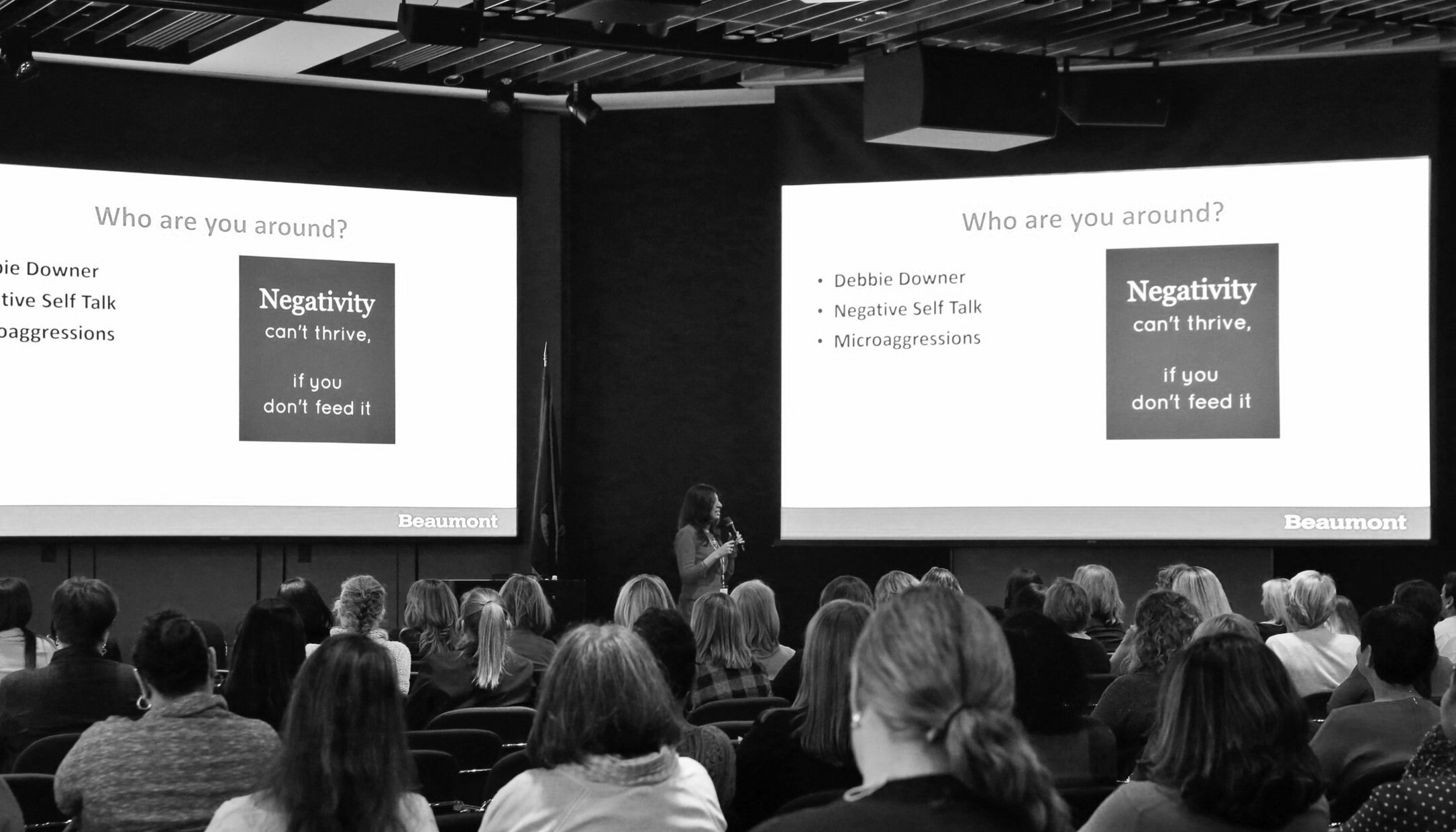
Public Speaking
Spreading the Truth About Health and Wellness
Dr. Shajahan is knowledgeable and passionate about various health subjects. The COVID-19 pandemic has increased the spread of false information, conspiracy theories, and incorrect facts. Public health and social justice are more connected than ever before. Her goal is to give people the knowledge they need to safeguard and enhance their well-being. To achieve this, she hosts an acclaimed podcast called Beaumont HouseCall, teaches in medical education, and writes and speaks about health for the public.
You can check out some of her previous work and reach out to her regarding your upcoming event.
Topics of Expertise and Passion
-
Wellness lives outside the walls of a hospital or clinic. It’s in our neighborhoods and in-bedded in our everyday lives. Learn how to improve your overall health through the 8 dimensions of wellness. This includes: physical, intellectual, emotional, environmental, social, financial, and spiritual health. Learn self-awareness strategies as well as how to unlearn habits that can change your life.
-
Community Health is the practice of disease prevention and health promotion. This includes overall wellness of both physical and mental health. Topics include promotion of quality of life, healthy development, and healthy behaviors across all life stages, climate change and medicine, diet and exercise, anxiety and depression, health literacy, misinformation, public health initiatives such as COVID-19, vaccines, racism and discrimination, gun violence, bullying, heart health, diabetes, hypertension, weight loss, sleep hygiene, brain health, stress management.
-
Dementia is a debilitating neurological condition that affects millions of individuals worldwide. It is characterized by a progressive decline in cognitive abilities, including memory loss, impaired judgment, and difficulty with communication and daily tasks. People living with dementia often experience confusion, disorientation, and mood changes that can be distressing for both themselves and their loved ones. Sadly, there is currently no cure for dementia, making it a lifelong condition requiring specialized care and support. However, with early detection, proper management, and a compassionate approach, individuals with dementia can still find moments of joy and connection amidst the challenges they face. It is crucial for society to build awareness, understanding, and resources to better support those living with dementia and their caregivers. By promoting research, improving access to care, and fostering a dementia-friendly community, we can strive towards enhancing the quality of life for individuals affected by this condition.
-
Health is where we live, work, learn, play, and pray. Health disparities are obstacles to health based on a person’s race, ethnicity, socioeconomic status, gender, age, mental health, physical disability, sexual orientation, religion, and zip code. These social factors are called the social determinations of health. Learn about the impact of the social determinants on health outcomes and what can be done to achieve health equity. Presentations given to health systems, residency programs, medical schools, universities, faculty, government officials, schools, nonprofits, and communities.
-
-
Every human being has biases. The term “unconscious bias” refers to the feelings and attitudes we have toward certain people or groups that we are not conscious of. While implicit/unconscious bias is unintentional and not a result of bad intent, it can lead us to judge people without even realizing it. This can influence every aspect of an organization, from hiring and promotions to daily operations. This is especially dangerous in healthcare, where decisions can mean life or death. When business decisions are influenced by unconscious bias it can have a major impact on the quality, diversity and culture of an organization. Learn about the basics of implicit bias and how it effects your industry whether it be a healthcare institution, medical school, residency, school, nonprofit, or business.
-
Medical misinformation is recognized as one of the most threatening challenges to global health. It can further hinder the cohesiveness of societies by increasing existing social inequities, stigmas, gender disparities, and generational rifts. Presentations include educating healthcare providers on how to address misinformation both online and in the office setting. This includes a didactic on misinformation's influence on society, media manipulation and how to have effective conversations with patients on health literacy. In addition, talks also are available to help the general public improve their health and media literacy by recognizing media manipulators and signs of unverified information.
-
-
-
Research shows that the arts have a positive impact in coping with illness and promoting wellness. Participating in creative expression can reduce anxiety, depression, pain and fatigue and improve the perceived quality of life. These therapies include music, dance, movement-based expression (such as acting), visual art and creating art. Arts in healthcare is a rapidly growing multidisciplinary field that integrates the arts—including performance, literary and visual—into a variety of healthcare and community settings for therapeutic, educational and expressive purposes. Art is medicine that empowers patients and you don’t have to be an artist to reap the benefits. Learn about how your health system can improve discharge times, infection rates and patient experience. In addition, how art can improve your daily health.
-
Evidence shows that spending time in nature is responsible for many measurable beneficial changes in the body including reduction of stress hormone, blood pressure, heart rate, anxiety and depression. Spending time in nature is good for your health. Learn about the importance of nature to health and how to incorporate more nature in your life. Incorporate nature prescriptions for patients and your employees. Learn how environmental justice effects health and ways you can advocate for a safer and healthier environment.
Contact Dr. Shajahan to schedule her for your upcoming event on these or other interesting subjects.
Featured Speaking Engagements
Thriving in Brain Health
When we think of physical health, we often forget about our brain health. The brain is arguably one of the most important parts of the physical body.
This talk gives 6 quick tips to improve your brain health.
Energy
Both positive and negative energy are contagious. Whatever you are thinking and feeling- you are projecting to others and impacting them.
Learn tips on how to change your internal vibration so that you can absorb and emit positive energy in your life.
“Health is not about the absence of illness but about our working conditions, education, housing, social inclusion and public policy”
— DR. ASHA SHAJAHAN
Let’s Get in Touch
info@drshajahan.com

















